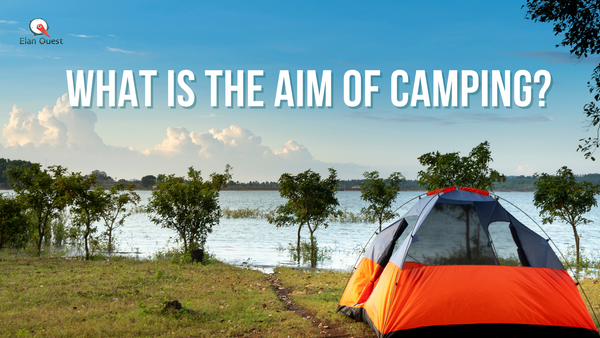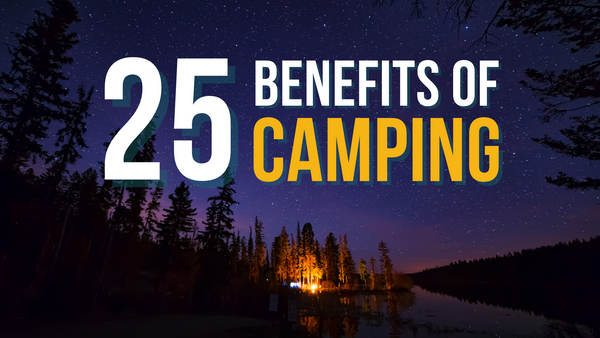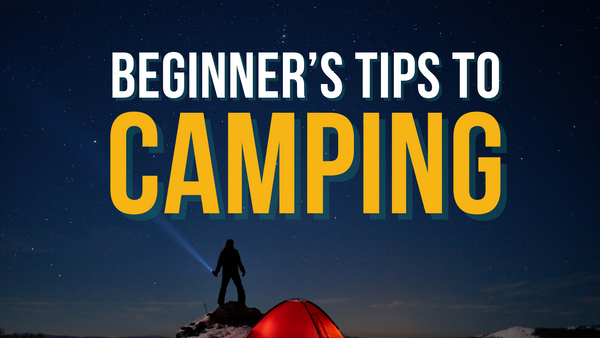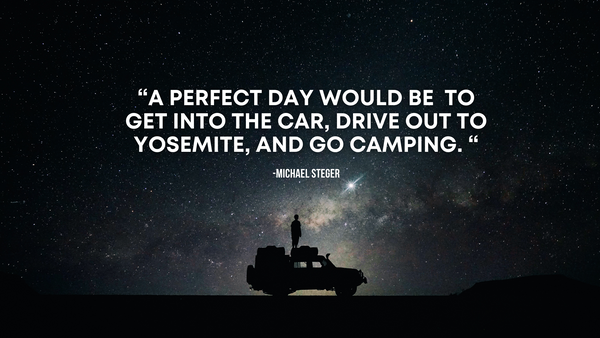Imagine a world free from the hustle and bustle of daily life-
Where the only alarm clock is the gentle whisper of the wind through the trees, and the only schedule is dictated by the rising and setting of the sun.
Welcome to the world of camping, where the outdoors becomes your playground!
Aside from making the outdoors your new happy place, did you know that there are endless camping benefits for you and your health?
We made this blog to help you explore the benefits of camping.
From reconnecting with nature and finding inner peace to fostering lifelong memories and nurturing your overall well-being- there’s just so much camping can offer!
Let’s dive right in and understand what camping can do for you other than bringing you on a great adventure!
What Is The Aim Of Camping?

The aim of camping can vary from person to person, but generally, it encompasses several common goals and objectives:
Reconnecting with Nature
Camping provides an opportunity to escape the confines of urban life and immerse oneself in the natural world. The aim is to establish a deeper connection with the environment, appreciate its beauty, and better understand the natural world.
Adventure and Exploration
Many campers seek the thrill of adventure and the chance to explore new places. The aim is to discover remote or less-visited areas, embark on hiking or backpacking expeditions, and uncover hidden gems in nature.
Escape and Relaxation
Camping offers a break from the stresses of everyday life. The aim is to find tranquility, unwind, and rejuvenate the mind and body in a peaceful outdoor setting.
Building Skills
For some, camping is an opportunity to acquire and hone various outdoor skills, such as fire-making, navigation, shelter-building, and outdoor cooking. The aim is self-sufficiency and self-reliance in the wilderness.
Recreation and Enjoyment
Camping is a form of recreation. The aim is to have fun through activities like fishing, swimming, bird-watching, or simply sitting by a campfire and sharing stories with friends and family.
Social Bonding
Camping often involves shared experiences with others. The aim is to strengthen relationships, build memories, and enjoy quality time with friends and family.
Disconnecting from Technology
Many campers aim to disconnect from the digital world temporarily. Camping provides an opportunity to escape the constant connectivity of modern life and enjoy the simplicity of the outdoors.
Personal Growth
Camping can be a means of personal growth and self-discovery. The aim is to challenge oneself, step out of one's comfort zone, and develop resilience and adaptability in the face of nature's unpredictability.
Environmental Stewardship
Some campers aim to be responsible stewards of the environment, engaging in trail maintenance and cleanup or practicing Leave No Trace principles to minimize their impact on natural areas.
Health and Well-Being
Camping often involves physical activities like hiking, which contribute to physical fitness. Additionally, exposure to natural light and fresh air can positively affect mental and emotional well-being.
Camping Statistics
Now, let's delve into the numbers.
Camping isn't just about adventure and exploration; it's also about well-being and happiness.
The Outjoyment Report reveals that 97% of campers are primarily motivated by happiness, 93% camp to deepen their connection with nature and improve well-being, 44% of campers exhibit optimal mental health, 88% camp to reduce stress, and 98% actively engage in outdoor activities, with hiking, cycling, and bird-watching being popular choices.
To learn about The Outjoyment Report, read more here.
Now that we have touched the science behind camping let’s cut to the chase and discover camping benefits!
25 Camping Benefits For You

Reduces Stress
Camping is an antidote to stress, offering a tranquil escape from the chaos of daily life.
The sounds of rustling leaves, chirping birds, and crackling campfires create a soothing atmosphere that calms the mind.
Being in nature lowers cortisol levels, reducing stress and promoting relaxation. This natural setting allows you to disconnect from work and responsibilities, leading to a mental reset.
Brings Fresh Air
Breathing in the crisp, clean air of the outdoors has numerous health benefits.
It oxygenates the body, enhances lung function, and revitalizes your senses.
This fresh air is free from the pollutants commonly found in urban environments, contributing to improved overall well-being.
Improves Relationships
Camping provides an ideal backdrop for building and strengthening relationships.
Whether you're with friends, family, or fellow campers, shared outdoor experiences create lasting memories and forge deeper connections.
The absence of modern distractions allows for meaningful conversations and quality time spent together.
Promotes Physical Fitness
Engaging in outdoor camping activities is a great way to stay physically active.
Hiking, swimming, and participating in outdoor games burn calories and improve cardiovascular health, muscular strength, and overall physical fitness.
Offers Better Sleep Quality
Camping often means sleeping under a canopy of stars serenaded by the sounds of nature.
This change from the usual urban environment can lead to improved sleep quality.
The tranquility of the outdoors and the absence of artificial lighting encourage more restful and rejuvenating sleep.
Unplug and Escape from Cyberspace:
In today's digital age, a camping trip provides a rare opportunity to disconnect from technology. Without the constant buzz of notifications and screens, you can focus on life's simple pleasures, fostering a sense of tranquility and mindfulness.
Enjoy Food Better
Cooking and dining outdoors are unique aspects of camping that enhance your appreciation for food.
Whether you're grilling marshmallows over a campfire or preparing a gourmet meal on a portable stove, the experience of eating in nature is both satisfying and memorable.
Connect with Nature
Camping allows you to immerse yourself in the natural world fully.
Surrounded by trees, rivers, and wildlife, you gain a deeper understanding of and connection to nature. This newfound appreciation can inspire a greater commitment to environmental stewardship.
Learn New Skills
Camping often involves acquiring practical outdoor skills, such as fire-making, navigation, shelter construction, and wilderness cooking.
This enhances self-sufficiency and fosters a sense of accomplishment and resourcefulness.
Grows Confidence
Overcoming the challenges of the outdoors, whether setting up camp in adverse weather or navigating rugged terrain, builds self-confidence.
These experiences instill resilience, adaptability, and the belief that you can overcome obstacles.
Boosts Vitamin D
Exposure to natural sunlight during camping trips is a reliable source of vitamin D.
This essential nutrient is crucial for overall health, helping to maintain strong bones, support the immune system, and regulate mood.
Offers A Healthy Environment
Camping often occurs in natural settings untouched by the pollution and stressors of urban life.
The fresh air and pristine surroundings promote well-being by reducing exposure to harmful pollutants.
Increases Production of Happy Hormones
The combination of physical activity, exposure to nature, and a break from the demands of modern life triggers the release of endorphins and serotonin, the body's natural "feel-good" hormones.
This boost in happy hormones improves mood and a general sense of well-being.
Stimulates Creativity, Inspiration, and Motivation
Nature's beauty has a profound impact on creativity and inspiration.
The serene landscape and the absence of distractions often lead to clearer thinking, creative breakthroughs, and heightened motivation.
Enhances Self-Awareness
The solitude and reflection that camping offers can lead to increased self-awareness.
Away from the noise and distractions of everyday life, you can delve deeper into your thoughts and emotions, gaining a better understanding of yourself.
Improves Problem-Solving Skills
The outdoors presents unique challenges, from navigating unfamiliar terrain to building a fire in adverse conditions.
Overcoming these challenges fosters problem-solving skills, critical thinking, and adaptability.
Provides Opportunity For Family Bonding
Camping provides an ideal setting for families to bond.
Shared experiences such as setting up camp, cooking, and exploring the wilderness create lasting memories and strengthen family ties.
Encourages a Sense of Independence in Children
Children who experience camping often develop a sense of self-reliance and independence.
They learn valuable life skills, gain confidence in their abilities, and develop a deep appreciation for nature.
Improves Mood
The combination of natural surroundings and physical activity significantly positively impacts mood.
Many campers report feeling more content and happier during and after their camping trips.
Serves As An Alternative Therapy for Mental Health Issues
For individuals with mental health concerns, camping can be an alternative therapy. The peace and solitude of the wilderness provide an opportunity for self-reflection, healing, and solace.
Cleans Lungs
The fresh air in natural settings helps clear and strengthen the respiratory system.
This is especially beneficial for individuals with respiratory conditions or those looking to maintain healthy lung function.
Enhances Brain Functions
Engaging in cognitive challenges while camping, such as navigation and problem-solving, stimulates brain functions.
The outdoors provides a mentally stimulating environment that can improve cognitive abilities.
Increases Energy Levels
The combination of physical activity and the refreshing outdoor environment boosts energy levels. Many campers return from their trips feeling invigorated and revitalized.
Involves Exercise
Camping often involves activities like hiking, biking, and swimming, which offer an excellent opportunity for exercise. Regular physical activity during camping trips contributes to overall fitness and health.
Allows Time For Meditation
The tranquility of the natural environment provides a serene backdrop for meditation and mindfulness. Camping allows you to disconnect from the busyness of life and find moments of peace and reflection.
Each of these camping benefits highlights the multifaceted advantages of spending time in the great outdoors, from the physical health improvements to the emotional and mental well-being that come from immersing oneself in nature. .
Beginner’s Tips For Camping

New to camping?
Here are some beginner’s tips to help you start your camping journey right!
Choose the Right Campground
Pick a well-established campground or campsite for your first trip. These sites often provide amenities like restrooms, potable water, and marked camping spots, making it easier for beginners.
Research and Plan
Research the location and the campground rules in advance. Make a checklist of what to bring, activities to do, and potential nearby attractions to explore.
Start with a Short Trip
For your first camping experience, consider a one or two-night trip to get accustomed to the outdoors. This allows you to test your gear and camping skills without committing to a lengthy stay.
Gear Essentials
Invest in essential camping gear, such as a tent, sleeping bag, camping stove, cookware, headlamp, and appropriate clothing for the weather.
If you’re looking for some camping gear essentials to get you started, we highly suggest you check out our camping gear choices. Shop here.
Practice Setting Up Your Tent
Before you head out, practice setting up your tent in your backyard or a nearby park. Familiarity with your equipment will save time and frustration at the campsite.
Check the Weather
Keep a close eye on the weather forecast for your camping dates. This will help you pack appropriately and prepare for any unexpected conditions.
Pack Light
Limit the gear you bring to the essentials. Packing can make your trip more manageable and enjoyable.
Safety First
Learn basic camping safety, including how to build a campfire, what to do in emergencies, and how to store food to prevent encounters with wildlife.
Dress in Layers
Dress in layers, even in warm weather, to be prepared for temperature fluctuations day and night. Remember to pack rain gear if there's a chance of wet weather.
Bring Proper Footwear
Quality, comfortable hiking boots or sturdy shoes are essential, especially if you plan on exploring trails or uneven terrain.
Campfire Etiquette
If you plan a campfire, follow all campfire regulations at your chosen site. Use established fire rings or stoves, and never leave a fire unattended.
Leave No Trace
Familiarize yourself with the Leave No Trace principles. These guidelines help protect the environment and ensure you leave the campsite as you found it.
Water and Food
Bring an adequate supply of water and food and a little extra for emergencies. Consider non-perishable, easy-to-prepare meals for your first trip.
Camp Close to Amenities
For added comfort, camp near restrooms or facilities with running water if possible. This can be particularly reassuring for beginners.
Share Your Itinerary
Before you leave, inform a trusted friend or family member of your camping plans, including your location and expected return date.
Learn Basic Outdoor Skills
Familiarize yourself with basic outdoor skills like navigation, knot tying, and campfire building. These skills will enhance your camping experience.
Respect Quiet Hours
Many campgrounds have designated quiet hours. Be mindful of fellow campers and keep noise levels down during these times.
Connect with Rangers
If you have questions or concerns, don't hesitate to approach park rangers or campsite hosts. They are valuable resources for information and assistance.
Enjoy Nature
Lastly, remember to take time to immerse yourself in nature. Put away your devices and enjoy the tranquility and beauty of the great outdoors.
The Bottomline

Remember, every camping trip is a step towards self-reliance and self-discovery. Whether you're a newbie or a seasoned camper, may the great outdoors continue to bring you happiness, inspiration, and rejuvenation. Happy camping!
FAQs
Camping Benefits For The Skin
There are several ways in which camping can benefit your skin:
- Fresh air and sunshine: Air and sunshine are good for your skin. Fresh air can help to remove toxins from your skin, while sunshine can help to boost your vitamin D levels. Vitamin D is important for skin health, as it can help to protect against skin cancer and other skin conditions.
- Reduced stress: Stress can cause several skin problems, such as acne, eczema, and psoriasis. Camping can reduce stress by allowing you to relax and get away from the hustle and bustle of everyday life.
- Increased physical activity: Camping often involves a lot of physical activity, such as hiking, swimming, and fishing. Physical activity is good for your overall health, including your skin. It can help to improve circulation, reduce inflammation, and promote cell renewal.
Advantages And Disadvantages Of Camping
Advantages
- Affordable: Camping is a relatively affordable way to vacation. You don't need to spend much money on accommodations or food.
- Healthy: Camping is a great way to get fresh air and exercise. It can also help to reduce stress.
- Fun: Camping can be a lot of fun. It's a great way to spend time with family and friends and enjoy the outdoors.
- Educational: Camping can be a great way to learn about nature and outdoor skills.
Disadvantages
- Uncomfortable: Camping can be uncomfortable, especially if you need to get used to it. You may have to sleep on the ground, deal with bugs, and go without some of the amenities you're used to at home.
- Dangerous: Camping can be dangerous if you're not careful. There are risks, such as wild animals, bad weather, and getting lost.
- Limited resources: When you're camping, you have limited resources. You may need to ration your food and water, and you may not have access to electricity or cell service.
- Not for everyone: Camping isn't for everyone. Some people simply don't enjoy the outdoors or being uncomfortable.
Overall, the advantages of camping outweigh the disadvantages for many people. Camping is a great way to get healthy, have fun, and learn about nature. However, it's important to be aware of the risks and prepared before camping.

